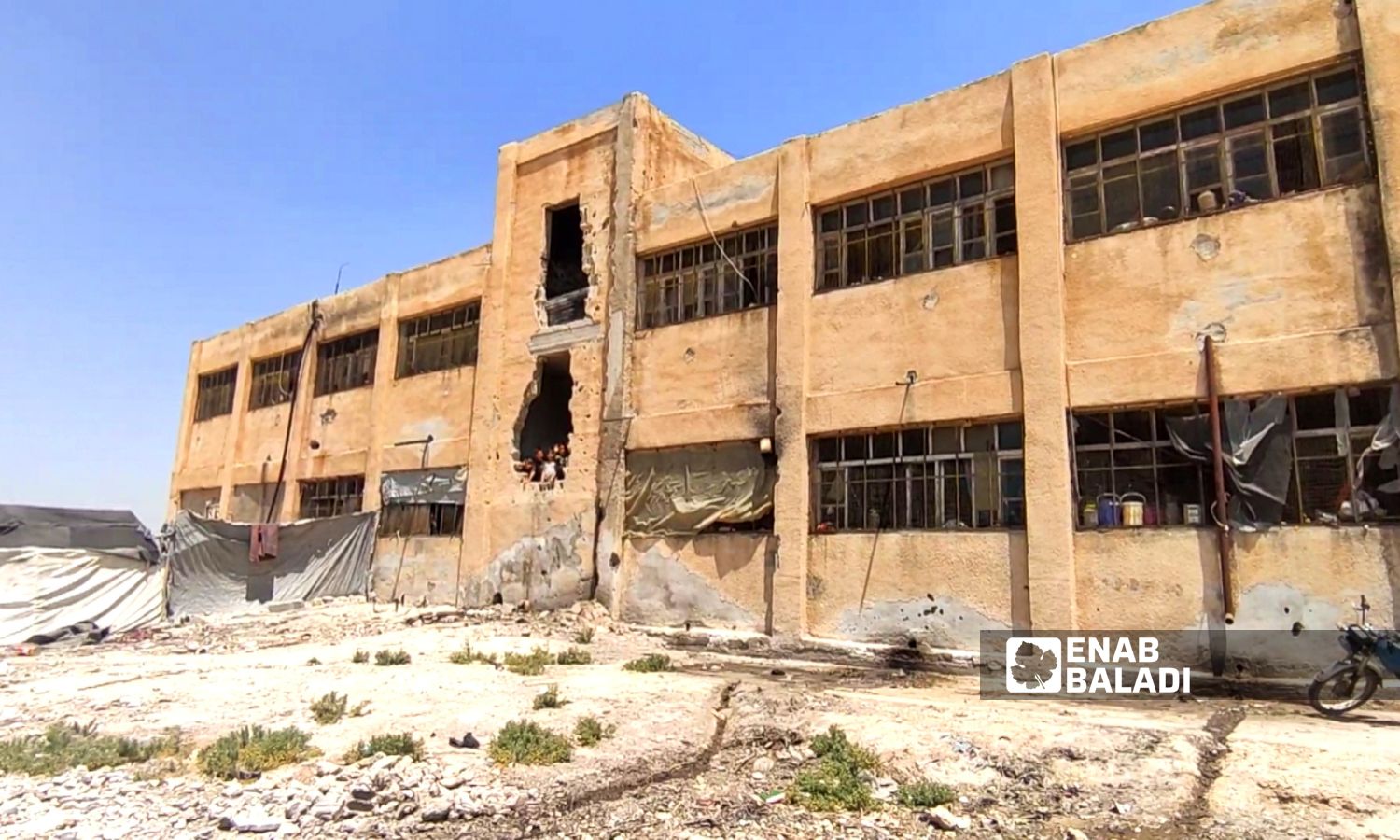



Enab Baladi – Tal Abyad
Many schools in the city of Tal Abyad in northern Raqqa countryside have gone out of service for reasons such as converting some of them into military and logistical points or housing displaced persons.
The Syrian National Army (SNA) and Turkish forces converted 13 schools into military and logistical points for themselves, disrupting the educational process there for years.
Additionally, 111 families live in eight schools due to lack of suitable housing.
On the other hand, 14 schools require full infrastructure rehabilitation, bringing the total number of out-of-service schools to 35, out of 300 schools in the region and its countryside.
The closure of these schools in areas controlled by the Syrian Interim Government (SIG) has negatively affected the educational process, deprived students of education, made it difficult for students to reach alternative schools, and burdened them and their families with transportation costs and long distances.
The residents of the schools are part of the displaced population in Tal Abyad and its countryside, where the total number of displaced families is 3,460 (19,614 individuals), according to the local council’s statistics in Tal Abyad.
The residents of Tal Abyad do not resent the displaced but consider them “guests,” according to locals interviewed by Enab Baladi. However, they demand solutions to reopen the schools, relocate the displaced, and provide them with essential services like water and electricity.
The occupation of these schools has forced many students to walk long distances to reach alternative schools, leading to a number of them dropping out due to rough roads and overcrowded classrooms, in addition to a significant percentage of them leaving education altogether.
Farhan al-Awad has to take his son to a school four kilometers away from their home daily, despite the presence of the Mushrefa al-Hassoun school nearby, which became out of service due to the “guest displaced persons.”
He told Enab Baladi that the distance his child walks in the summer and winter is exhausting, noting that this situation adds a burden to the family, as it consumes more time and costs and makes obtaining regular education more difficult.
Mohamed al-Salman (13 years old), residing in the village of Ain Arous near Tal Abyad, has to walk five kilometers daily to reach his new school, noting that it is a difficult journey and its hardship increases in winter.
The schools controlled by the National Army and Turkish forces have turned into military points, which residents avoid talking about out of fear of arrest or other security risks.
Displaced people live in small camps, while others reside in schools or rent homes in the countryside and city, suffering from severe lack of support and extreme poverty, as well as a shortage of basic services.
Ali al-Mohammad, displaced from the city of al-Safira in rural Aleppo to Tal Abyad, said he couldn’t find alternative housing other than the Hammam al-Turkman South school, where he has lived with his family for five years.
Al-Mohammad (60 years old) added that he did not receive any promises of relocation to a better place than the schools, but the local council proposed moving the families to villages close to the international M4 highway.
He told Enab Baladi that the resident families refused this offer due to the village’s distance from the city center and its proximity to the front lines with the Syrian Democratic Forces (SDF) and regime forces, which puts them at risk.
He pointed out that the absence of international organizations in the area hinders the construction of pre-built homes to protect them from summer heat and winter cold. Despite this suffering, there have been no serious promises to improve their situation.
Adnan al-Mansour, residing in the Salouk al-Gharbiya school, complained about the lack of services in the school, as the village of Salouk is far from the center of Tal Abyad.
He told Enab Baladi that no organizations provide them with support and that water and electricity services are not available to them, forcing them to rely on water tankers and electricity generators to meet their needs. He added that the lack of these basic services made adjusting to the current conditions more difficult.
He pointed out that the situation requires urgent intervention by organizations and concerned parties to improve the conditions and meet their basic needs.
The director of education in the local council of Tal Abyad, Abdullah Alayeh, said that the number of students in the Tal Abyad area reached 29,500, noting that many schools have turned into private housing for the displaced, causing overcrowding in the neighboring schools accommodating students.
He told Enab Baladi that about 5,000 students have lost their schools or moved to other schools, prompting the council to organize morning and evening shifts to reduce overcrowding.
He pointed out that the local council is in contact with several organizations to find effective solutions to secure private housing for the displaced.
The population of Tal Abyad city is 138,465 people, most of whom live in difficult economic conditions due to the lack of job opportunities, and the majority of residents rely on agriculture and livestock.
In 2019, Turkey and the National Army took control of the entire city of Tal Abyad and its eastern countryside, in addition to part of its southern countryside up to the international M4 highway, and part of the western countryside up to 15 kilometers, as part of Turkey’s military Peace Spring operation.
if you think the article contain wrong information or you have additional details Send Correction